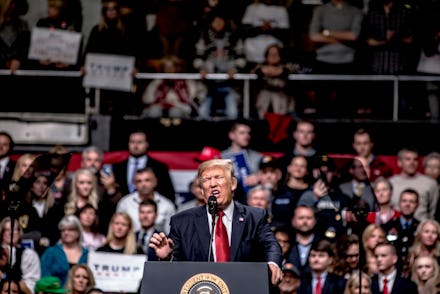Conservatives blast Hawaii for "not caring" about attacks, apparently forgot Pearl Harbor

A federal judge in Hawaii blocked President Donald Trump's revised immigration order Wednesday, granting a motion for a temporary restraining order against the de facto Muslim ban.
It was the second time a judge had foiled Trump's efforts to stop travelers from majority-Muslim countries from entering the United States. In February, a U.S. district court judge in Seattle issued a temporary block against the executive order Trump signed on Jan. 27.
"Turns out, an illegal Muslim ban by another name is still an illegal Muslim ban," Sen. Elizabeth Warren (D-Mass.) remarked on Twitter.
Right-wing Twitter users responded to the Wednesday decision by accusing the federal judge — and Hawaii more generally — of not caring about or not fully understanding the dangers of an attack carried out by people from other countries:
The hashtag #BoycottHawaii began proliferating across Twitter:
Tweets lambasting the state for failing to sympathize with the victims of the Sept. 11, 2001, terrorist attacks cropped up, as did posts preemptively blaming Hawaii for future attacks on U.S. soil:
Ironically, as many other Twitter users pointed out, few places in the U.S. are more intimately familiar with the consequences of foreign attacks than Hawaii.
On Dec. 7, 1941, the Japanese military staged an aerial sneak attack on the American naval base at Pearl Harbor on Oahu, killing more than 2,300 people, spurring the United States' entry into the Second World War and precipitating the forced internment of 117,000 Japanese Americans.
The Pearl Harbor attack — which occurred 75 years ago December — is widely described as the deadliest attack on U.S. soil until Sept. 11, 2001 (though Hawaii did not obtain official statehood until 1959). Its fallout was not just colossal for Hawaiians and U.S. military personnel. It set off a chain of events — from entry into the war, to the atomic bomb being dropped on the Japanese cities of Hiroshima and Nagasaki, to the launch of the Cold War — that shaped geopolitics for decades to come.
Perhaps even more telling is how residents of New York City — where the deadliest of the 9/11 terrorist attacks actually occurred — overwhelmingly voted against Trump. New Yorkers took to the streets by the hundreds of thousands to protest the president's inauguration in January, and hundreds more flooded JFK airport and the city when Trump's first Muslim ban went into effect.
Even the U.S. counties where the deadliest terror attacks have occurred since Trump announced his candidacy — Charleston County, South Carolina; San Bernardino County, California; and Orange County, Florida (where Orlando is located) — all voted for Trump's opponent, Hillary Clinton. It appears, in reality, that Trump's base is actually more out of touch with the consequences of such an attack than those living in the country's bluer regions.